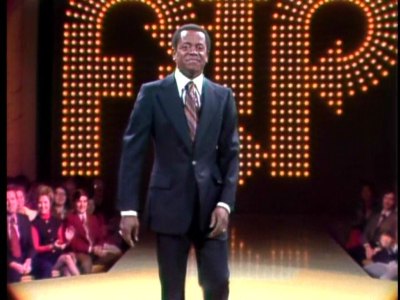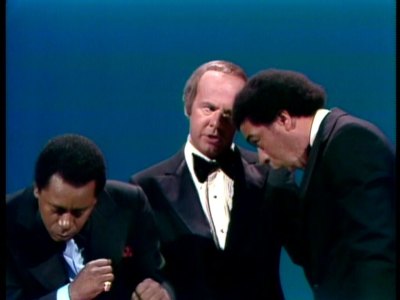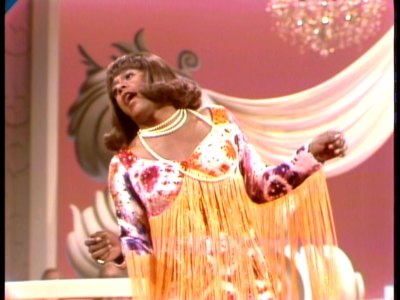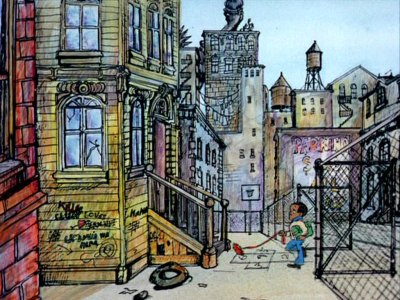| Reviews & Columns |
|
Reviews DVD TV on DVD Blu-ray 4K UHD International DVDs In Theaters Reviews by Studio Video Games Features Collector Series DVDs Easter Egg Database Interviews DVD Talk Radio Feature Articles Columns Anime Talk DVD Savant Horror DVDs The M.O.D. Squad Art House HD Talk Silent DVD
|
DVD Talk Forum |
|
|
| Resources |
|
DVD Price Search Customer Service #'s RCE Info Links |
|
Columns
|
|
|
Best of the Flip Wilson Show, The
For about two years, from 1970 to 1972, Flip Wilson was the single most influential comedian on American TV, and therefore, in the world. Forget Bill Cosby. Forget Johnny Carson. Or Richard Pryor or George Carlin or Cheech and Chong. Flip was it. The first black superstar on network TV with his NBC variety series The Flip Wilson Show, Flip's characters such as the sassy, outrageous Geraldine, the con man Reverend Leroy of the Church of What's Happenin' Now, and lecherous Freddy the Playboy, and their famous lines such as, "The Devil made me do it," and "What you see is what you get," became national catchphrases. Watching Flip was a Thursday night ritual in our house and across the country (or at least until The Waltons came along and made Flip second choice), with his show jumping immediately in the national ratings to the second most watched show on television for an astounding two years straight.

But of course, as with most shows that burn that brightly that fast, The Flip Wilson Show burned out twice as fast as most others, too. By Flip's third year, newcomer The Waltons rather astoundingly beat Flip in his time period; Flip would drop a precipitous ten spots on the Nielsen charts, winding up 12th for the year. NBC, refusing to believe a show about poor white people in the South during the Depression could really put down their urbane, sophisticated black superstar, didn't move The Flip Wilson Show for his fourth year. It was a disastrous mistake; The Waltons juggernaut further buried the show, and by the end of the 1973-1974 season, The Waltons sat firmly in Flip's old 2nd place rating, while Flip himself was canceled and essentially, forgotten. Never fully recovering from his meteoric rise and fall as a network TV power, Flip had various projects come and go for the next twenty-five years or so, but none of them caught fire, and after numerous bad encounters with substance abuse, Flip died of liver cancer in 1998. I'm not sure a lot of people at the time of his death hadn't already forgotten about him years before.
What I remember most about Flip's show, other than the fact that he was perhaps one of the most graceful, fluid comedians I had ever seen on the stage, was the fact that a lot of people - a lot of African-American critics and social commentators, as well as white liberals, in particular - didn't like Flip or his show. Flip was determinedly unapologetic about his so-called "stereotype" humor. While many black commentators and leaders found his characters demeaning, Flip refused to apologize for creating them - and making a mint off them. There were those who went so far as to excuse his success by saying Flip was actually being subversive, and that characters like Geraldine and Rev. Leroy were in fact subtly reflexive, lampooning the very genre of "stereotype" humor from which they came. But Flip wouldn't have any of that, either. To him, the characters were what they were, and humor was to be found in their actions, as well as their culture, the same way somebody like Jeff Foxworthy talks about his culture.
I suspect that it also didn't sit well at this time of black empowerment and racial tension throughout the country, that Flip's audience was overwhelmingly white - and that he had absolutely no qualms about this. In fact, he openly courted and desired such an audience, and why shouldn't he have? Network TV at the time was lily white, both in content and in audience, and to be the first black entertainer to cross-over, if you will, in such a spectacular fashion as Flip did, was quite an accomplishment, and a testament to his skills as a performer. He truly was a pioneer, in that often overused term, and yet many people felt he somehow should have apologized for his success - particularly when they took offense at the methods by which he gained that fame. But he wasn't having any of that, and good for him for refusing to bow to such ridiculous political pressure. Flip appealed to America for one reason, and one reason only: he was charismatically, hysterically funny. And no comedian should have to apologize or feel guilty for that.

Watching Rhino's three-disc set, The Best of The Flip Wilson Show today, Flip still comes off as magnetically entertaining as I remember him from my youth. Displaying supreme ease and confidence in his fluid body movements, Flip effortlessly connects with his audience, often selling the joke with his body before the punchline reaches your brain. Flip had to have had a lot of confidence to come out on that bare stage (The Flip Wilson Show was considered quite innovative at the time for its "theatre in the round" set design), totally vulnerable from all sides, and do his various acts. There weren't any big production numbers to hide behind, nor elaborate costumes or sets - it was usually just Flip, and maybe a co-star, acting out one funny skit after another.
Funny enough on his own, telling one of his amusing stories or monologues at the beginning of his show, Flip went into true comedy myth status when he appeared as his most character, Geraldine. There's no way to describe Flip as Geraldine; you just have to experience his embodiment as the sassy working girl to truly appreciate it. I say "embodiment" because this isn't just some mere impersonation or characterization - Flip literally channels Geraldine. He becomes her, until you forget you're really just watching a man in drag, one of the oldest forms of entertainment there is. While some felt that the character was somehow demeaning, I can't for the life of me see how, and neither could Flip. Sexual yet essentially innocent, with a whip-smart intelligence and humor, and a take-no-guff attitude, Geraldine was the very epitome of the "new woman" of the feminist movement. Perhaps that's what made some people so mad; it took a man impersonating a woman to give the movement one of its most memorable icons.
As for The Best of The Flip Wilson Show, I find it curious that Rhino collected episodes from the last two years of the series, and not from the first two (save for one episode from his second season). The first two seasons were really the glory years of the series, when Flip was unstoppable in the ratings, and his act was fresh and new. The guest stars were bigger, and Flip was demonstrably more confident; his performances were frequently electric in their intensity. The episodes gathered here, while okay from a standpoint of seeing Flip after so many years, are alas not the best representation of the series or the comedian. In particular, the episodes that come from the last season prove to be a mixed lot, mostly because Flip clearly is aware of the tenuousness of his show. There's a vaguely haunted look in his eyes in these episodes, a loss of confidence that's distinct and noticeable, and which occasionally throws off his timing. Surely he was aware of his ever-sinking ratings, and there's little doubt he knows his show is going to end. Why can't we see the first time Geraldine appeared? Or Rev. Leroy? Where's the pilot episode? Or the first regular episode in the series? Again, I'm not sure why Rhino chose to look at these later episodes (perhaps it's a clearance issue?), but a first-ever compilation of one of TV's most influential and important performers should have started at the beginning, and given us a look at Flip at his absolute peak.

DISC ONE:
Episode #49: Broadcast 2/24/72
Flip plays host to Joe Namath (ingratiating but a stiff), the Miss Black America finalists, and George Carlin (who does his usual schtick). Check out Geraldine's appearance at a fashion show.
Episode #65: Broadcast 12/14/72
Johnny Cash and June Carter Cash (both really game for Flip's nonsense) join Flip, as well as incredibly tall Bill Russell for some funny skits, including a take-off on Moby Dick, and a funny square dance where Geraldine unexpectedly pops up out of a cake. Watch out for some absolutely hysterical appearances by an impossibly young Albert Brooks, doing a memorable ventriloquist bit and a talent search for a new national anthem. Why Brooks didn't take off, and Steve Martin did, is a mystery to me.
DISC TWO:
Episode #71: Broadcast 2/1/73
Flip entertains a really off her mark Phyllis Diller, does a funny hostile bit with his musical director George Wyle, and listens to the smokey blues of Mr. Ray Charles. Oh, and The Committee, one of the worst of the hippie era comedy groups, shows up.
Episode #80: Broadcast 10/1/73
Flip welcomes NBC's then-current black superstar, Redd Foxx, to his show, performing several skits together that shows their timing together is somewhat lacking. Joan Rivers shows up; she's better in her monologue than in the skits, and Helen Reddy is...Helen Reddy.
DISC THREE:
Episode #84: Broadcast 11/29/73
The almost incomprehensible trio of Flip Wilson, Richard Pryor and Tim Conway prove to be quite funny in a knockabout skit that shows Pryor in a rare, slapstick mode. Romark the Mentalist (god, I remember him!) does a couple of nice bits, too. Legendary for the Pryor and Flip teaming. And Conway, for that matter, too.
Episode #94: Broadcast 3/7/74
The incomparable Lena Horne shows up on Flip's show, as well as Bob & Ray (overrated), as well as Tony Randall (hamming it up to the extreme, but still funny).

The DVD:
The Video:
Originally shot on video, the full-frame The Best of The Flip Wilson Show looks about as good as it's going to look here, with a solid transfer that avoids the hot spots normally seen in the old video productions.
The Audio:
The English 2.0 mono soundtrack is an accurate recreation of the original television presentation. There are no subtitles or close-captioning options.
The Extras:
For animation fans, there are two extras included here on The Best of The Flip Wilson Show that should be reason alone to purchase the set. Two one-half hour cartoons, commissioned by NBC as part of Flip's contract, and produced by famed animation studio DePatie-Freleng, are here, perhaps seen for the first time since their releases in 1972 and 1974. Cleroy Wilson and the Miracle of P.S. 14 (1972, on disc one) and Clerow Wilson's Great Escape (1974, on disc two) are miraculously rendered cartoons in the distinctive DePatie-Freleng style, and are marvelously entertaining little shorts. Playing like a cross between the Peanuts specials and Fat Albert, the Cleroy shorts are something to treasure, and animation buffs and DePatie-Freleng fans will want to seek out The Best of The Flip Wilson Show just to complete their collection. On disc one, there's also an insightful interview with producer Bob Henry, who gives some affectionate recollections of the importance of Flip's career and show. On disc two, there's a newly filmed intro with Phyllis Diller, discussing her time on the show (she comes off better here, than on the show), as well as a photo gallery of some moments from Flip's show. And on disc three, there's a similarly filmed new intro with Tim Conway, who couldn't be more gracious in discussing Flip. There's also a text bio called Flip Wilson: Portrait of an Artist, that briefly discusses his importance in the history of TV.
Final Thoughts:
While I would have preferred that Rhino focused more on the early years of Flip's series, any full-length episodes from The Flip Wilson Show are welcome additions to any serious fan of comedy or vintage TV. Unjustly neglected by TV historians, Flip Wilson was not only one of the funniest comedians to ever headline his own show, but a pioneer in his field. His brilliant character invention, Geraldine, is a genuine pop culture icon. If you remember watching Flip when you were a kid, or if you want to see one of the most influential comedians of the 20th century in action, I highly recommend buying The Best of The Flip Wilson Show.
Paul Mavis is an internationally published film and television historian, a member of the Online Film Critics Society, and the author of The Espionage Filmography.


|
| Popular Reviews |
| Sponsored Links |
|
|
| Sponsored Links |
|
|
| Release List | Reviews | Shop | Newsletter | Forum | DVD Giveaways | Blu-Ray | Advertise |
|
Copyright 2024 DVDTalk.com All Rights Reserved. Legal Info, Privacy Policy, Terms of Use,
Manage Preferences,
Your Privacy Choices | |||||||













